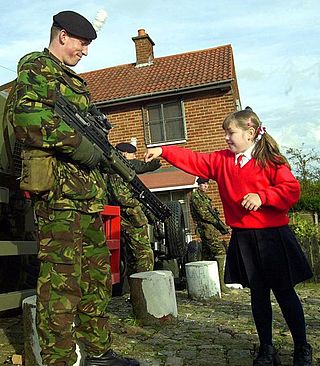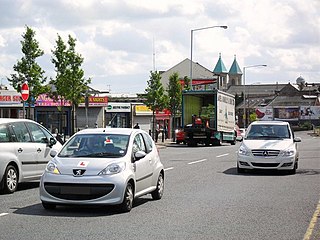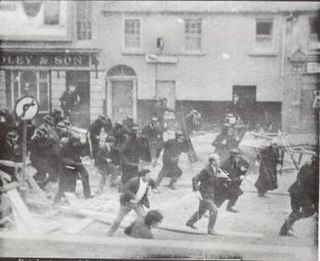
Ian Richard Kyle Paisley, Baron Bannside, was a loyalist politician and Protestant religious leader from Northern Ireland who served as leader of the Democratic Unionist Party (DUP) from 1971 to 2008 and First Minister of Northern Ireland from 2007 to 2008.

Robert Thomas William McCrea, Baron McCrea of Magherafelt and Cookstown is a Democratic Unionist Party (DUP) politician, Christian singer and retired Free Presbyterian minister from Northern Ireland. As a politician, he represented South Antrim and Mid Ulster as their Member of Parliament (MP), representing Mid Ulster from 1983 to 1997; then South Antrim between 2000 and 2001, and then again from 2005 to 2015.
Irish republicanism is the political movement for an Irish republic, void of any British rule. Throughout its centuries of existence, it has encompassed various tactics and identities, simultaneously elective and militant and has been both widely supported and iconoclastic.

The Holy Cross dispute occurred in 2001 and 2002 in the Ardoyne area of north Belfast, Northern Ireland. During the 30-year conflict known as the Troubles, Ardoyne had become segregated – Ulster Protestants and Irish Catholics lived in separate areas. This left Holy Cross, a Catholic primary school for girls, in the middle of a Protestant area. In June 2001—during the last week of school before the summer break—Protestant loyalists began picketing the school, claiming that Catholics were regularly attacking their homes and denying them access to facilities.

"The Sash" is a ballad from Northern Ireland commemorating the victory of King William III in the Williamite War in Ireland in 1690–1691. The lyrics mention the 1689 Siege of Derry, the 1689 Battle of Newtownbutler near Enniskillen, the 1691 Battle of Aughrim, and the 1690 Battle of the Boyne. It is popular amongst Ulster loyalists and many other unionists in Northern Ireland, it also remains a popular folk ballad in parts of Ireland and Scotland.

Ardoyne is a working class and mainly Catholic and Irish republican district in north Belfast, Northern Ireland. It gained notoriety due to the large number of incidents during The Troubles.

The Twelfth is a primarily Ulster Protestant celebration held on 12 July. It began in the late 18th century in Ulster. It celebrates the Glorious Revolution (1688) and victory of Protestant King William of Orange over Catholic King James II at the Battle of the Boyne (1690), which ensured a Whig political party and Anglican Ascendancy in Ireland and the passing of the Penal Laws to disenfranchise and persecute the nation's Catholic majority, and to a lesser extent Protestant Dissenters, until Catholic Emancipation in 1829.
The Ulster Protestant Volunteers was a loyalist and Reformed fundamentalist paramilitary group in Northern Ireland. They were active between 1966 and 1969 and closely linked to the Ulster Constitution Defence Committee (UCDC) and Ulster Volunteer Force (UVF), established by Ian Paisley and Noel Doherty in 1966.

Captain Robert Laurence Nairac was a British Army officer in the Grenadier Guards who was abducted from a pub in Dromintee, south County Armagh, during an undercover operation and killed by the Provisional Irish Republican Army (IRA) on his fourth tour of duty in Northern Ireland as a Military Intelligence Liaison Officer.

The Shankill Road bombing was carried out by the Provisional Irish Republican Army (IRA) on 23 October 1993 and is one of the most well-known incidents of the Troubles in Northern Ireland. The IRA aimed to assassinate the leadership of the loyalist Ulster Defence Association (UDA), supposedly attending a meeting above Frizzell's fish shop on the Shankill Road, Belfast. Two IRA members disguised as deliverymen entered the shop carrying a bomb, which detonated prematurely. Ten people were killed: one of the IRA bombers, a UDA member and eight Protestant civilians, two of whom were children. More than fifty people were wounded. The targeted office was empty at the time of the bombing, but the IRA had allegedly realised that the tightly packed area below would inevitably cause "collateral damage" of civilian casualties and continued regardless. However, the IRA have denied this saying that they intended to evacuate the civilians before the explosion. It is alleged, and unearthed MI5 documents appear to prove, that British intelligence failed to act on a tip off about the bombing.

Operation Demetrius was a British Army operation in Northern Ireland on 9–10 August 1971, during the Troubles. It involved the mass arrest and internment of people suspected of being involved with the Irish Republican Army (IRA), which was waging an armed campaign for a united Ireland against the British state. It was proposed by the Unionist government of Northern Ireland and approved by the British Government. Armed soldiers launched dawn raids throughout Northern Ireland and arrested 342 in the initial sweep, sparking four days of violence in which 20 civilians, two IRA members and two British soldiers were killed. All of those arrested were Irish republicans and nationalists, the vast majority of them Catholics. Due to faulty and out-of-date intelligence, many were no longer involved in republican militancy or never had links with the IRA. Ulster loyalist paramilitaries were also carrying out acts of violence, which were mainly directed against Catholics and Irish nationalists, but no loyalists were included in the sweep.

During 12–16 August 1969, there was an outbreak of political and sectarian violence throughout Northern Ireland, which is often seen as the beginning of the thirty-year conflict known as the Troubles. There had been sporadic violence throughout the year arising out of the Northern Ireland civil rights campaign, which demanded an end to discrimination against Catholics and Irish nationalists. Civil rights marches had been attacked by Protestant loyalists, and protesters often clashed with the Royal Ulster Constabulary (RUC), the overwhelmingly Protestant police force.
The Battle of St Matthew's or Battle of Short Strand was a gun battle that took place on the night of 27–28 June 1970 in Belfast, Northern Ireland. It was fought between the Provisional Irish Republican Army (IRA), and Ulster loyalists in the area around St Matthew's Roman Catholic church. This lies at the edge of the Short Strand, a Catholic enclave in a mainly-Protestant part of the city. Violence had erupted there, and in other parts of Belfast, following marches by the Orange Order. The battle lasted about five hours and ended at dawn when loyalists withdrew. The British Army and police were deployed nearby but did not intervene. Three people were killed and at least 26 wounded in the fighting, while another three were killed in north Belfast.

The Balmoral Furniture Company bombing was a paramilitary attack that took place on 11 December 1971 on Shankill Road, Belfast, Northern Ireland, resulting in four deaths.
Samuel Smyth was a Northern Irish loyalist activist. A founder member of the Ulster Defence Association (UDA) he was the early public face of the movement as the organisation's spokesman, and he later became involved in the group's attempts to politicise. He was assassinated by the Provisional IRA as part of the Troubles. Author Steve Bruce described Smyth as the "sometime editor of the Ulster Militant and a loose cannon who enjoyed an exciting and erratic relationship with the UDA".
During the 2012 North Belfast Riots sectarian disorder and rioting between loyalists and republicans occurred when rival parades, authorised by the Parades Commission, took place.
Scottish-Irish Canadians or Scots-Irish Canadians are those who are Ulster Scots or those who have Ulster Scots ancestry and live in or were born in Canada. Ulster Scots are Lowland Scots people and Northern English people who immigrated to the Irish Province of Ulster from the early 17th century after the accession of James I to the English throne. This was known as the Plantation of Ulster.
On 14 November 1992, the Ulster Defence Association (UDA), a loyalist paramilitary group, launched an attack on James Murray's bookmakers on the Oldpark Road in Belfast, Northern Ireland. A gunman fired on the customers with an assault rifle, while another threw a grenade inside. Three civilians were killed and thirteen wounded. The shop was in a Catholic and Irish nationalist area, and all of the victims were local Catholics. The attack was likened to the Sean Graham bookmakers' shooting carried out by the UDA earlier that year.
On 28 March 1991 a member of the Ulster Volunteer Force (UVF), a loyalist paramilitary group, shot dead three Catholic civilians at a mobile shop in Craigavon, County Armagh, Northern Ireland. The gunman boarded the van and shot two teenage girls working there, then forced a male customer to lie on the pavement and shot him also. The killings were claimed by the "Protestant Action Force", who alleged the mobile shop was owned by an Irish republican. Staff said they had been harassed by Ulster Defence Regiment (UDR) soldiers for not serving them.

Holy Cross is a Northern Irish drama television film, directed by Mark Brozel and written by Terry Cafolla, and starring Zara Turner and Bronagh Gallagher. It premiered on RTÉ One on 8 November 2003, before receiving its broadcast on BBC One on 10 November 2003.











